Legislature passes bill requiring Alabama Ethics Commission to share exculpatory evidence with the accused

On Tuesday, both houses of the Alabama Legislature voted to pass a conference committee version of legislation requiring that the Alabama Ethics Commission share evidence uncovered that would exonerate persons accused of wrongdoing. Senate Bill 103 was sponsored by State Sen. Arthur Orr (R-Decatur). It was carried in the House by State Representative Cynthia Almond (R-Tuscaloosa). Sen. Orr said that the changes in the bill had to do with the whistle-blower protection act. Rep. Almond explained when the bill was on the House floor, “What the bill does is require the ethics commission to turn over exculpatory information once the matter has gone through the investigative phase.” This legislation is in response to a controversial advisory opinion issued last year by the Alabama Ethics Commission. It was stated that it was the position of the Commission that it does not have a legal responsibility to share any exonerating evidence with the attorneys of persons the Commission is investigating. Alabama Attorney General Steve Marshall strongly objected to that position. Marshall said that this violated the rules of evidence and that failing to disclose exculpatory evidence could jeopardize the integrity of future prosecution. In response, the Attorney General’s office has sued the Alabama Ethics Commission to force the Commission to overturn the policy. Marshall has even gone so far as to argue that any referral to prosecute someone from the Ethics Commission is “worthless,” given the possibility that the Ethics Commission’s staff had suppressed evidence showing that the accused may actually be innocent of the crimes they have been charged with. “Thus, the respondent can neither be confident that he fully understands the case against him, nor that the exculpatory evidence has been considered by the Ethics Commission before it votes on whether to refer the matter for prosecution or administrative resolution,” the lawsuit states. “In either case, the respondent’s legal defense is impeded.” According to the synopsis, “This bill would require the State Ethics Commission, before referring a case for prosecution of an alleged ethics or campaign finance violation or before resolving a violation administratively, to provide the person who allegedly violated the law with exculpatory evidence in the possession of the commission.” Passage of SB103 means that the Ethics Commission will have to share any evidence it finds indicating that the accused may be innocent of whatever crimes they have been accused of. Both Houses voted to concur with the conference committee version of SB103 on the last day of the regular session. The Alabama Constitution limits the regular session to no more than thirty legislative days. To connect with the author of this story or to comment, email brandonmreporter@gmail.com.
AG Steve Marshall files lawsuit against Alabama Ethics Commission policy
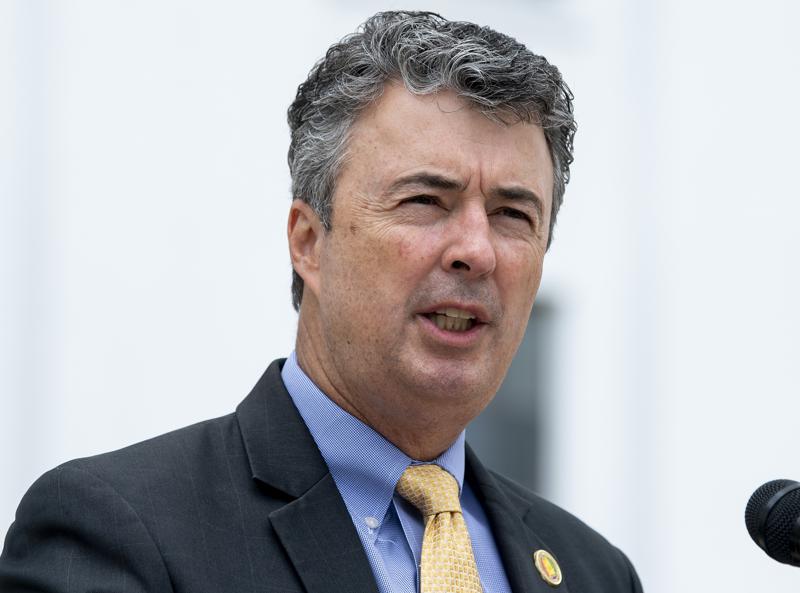
Attorney General Steve Marshall has filed a lawsuit against the Alabama Ethics Commission, seeking to revoke a recent advisory opinion. According to the Alabama Political Reporter, this type of lawsuit, where one state agency sues another, is quite rare. The lawsuit, filed Monday in Montgomery County Circuit Court, names Commissioners John Plunk, Stan McDonald, Lynn Stuart, Ed Crowell, and executive director Tom Albritton as defendants. The lawsuit says the Ethics Commission’s rule 2022-13 is in violation of the Alabama Administrative Procedures Act. The commission adopted an opinion this year stating that it had no responsibility to disclose to individuals under investigation any exculpatory information it might uncover during the course of the investigation. The lawsuit argues that the Brady rule was established in a 1963 federal case, Brady v. Maryland, and requires prosecutors to disclose material favorable to the accused as a matter of due process. In the lawsuit, Marshall says his office cannot trust the referrals for criminal investigation or administrative resolutions because of the policy of not disclosing exculpatory information to the person under investigation, a policy supported by an Ethics Commission advisory opinion adopted in July. Essentially, the Ethics Commission’s ruling argues that if, during the course of an investigation, evidence is found that would aid the person under investigation, the Commission has no responsibility to disclose said information, even if it could end the investigation and clear that person’s name. “Thus, the respondent can neither be confident that he fully understands the case against him, nor that the exculpatory evidence has been considered by the Ethics Commission before it votes on whether to refer the matter for prosecution or administrative resolution,” the lawsuit states. “In either case, the respondent’s legal defense is impeded.” In a statement this morning, Albritton defended the policy. “We disagree with the AG’s analysis and conclusions because the Opinion accurately reflects existing case law on the issue, and the Commission is bound by that precedent,” Albritton stated. “As stated by the Commission publicly when they approved the Advisory Opinion, however, the Commission welcomes a court of competent jurisdiction to review these issues in light of the applicable statutory provisions and existing case law and will abide by whatever direction that Court gives us.” According to the Ethics Commission website, the mission of the Commission is to ensure that public officials are independent and impartial, that decisions and policies are made in the proper governmental channels, that public office is not used for private gain, and that there is public confidence in the integrity of government.
Donors fund Alabama’s birthday celebration, including event for officials
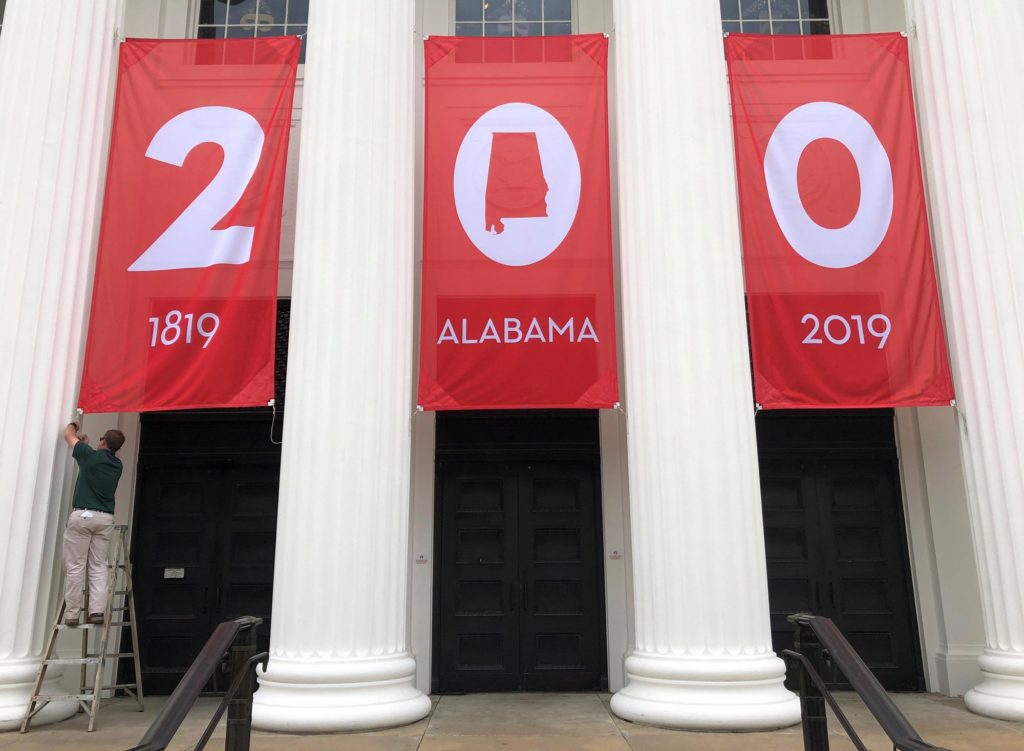
Corporations and other groups contributed more than $3 million to pay for Alabama’s 200th birthday celebration, which includes public festivities and educational programs but also an invitation-only event that the governor and other state officials will attend. Alabama Power Co., Regions, Airbus, Mercedes-Benz, Altec and the Poarch Creek Indians are among the groups that collectively donated more than $3 million to the foundation created to raise money for the bicentennial celebration, according to the Alabama Bicentennial Commission. Alabama’s lengthy celebration of the 200th anniversary of its admission to the United States will culminate Saturday at the state Capitol. The state’s only federally recognized Indian Tribe, the Poarch Band of Creek Indians, is paying for a “state of the art” digital projection and sound show for the finale of the Saturday celebration. The commission did not disclose how much that event will cost. The donations funded grants, exhibits, a bicentennial park at the state Capitol and other public aspects of the celebration, according to a news release from the commission. Daniel Sparkman, a spokesman for the commission, said the donations are also paying for the closed-door event. The program for the invitation-only event Friday at the Montgomery Performing Arts Center will include former Secretary of State Condoleezza Rice as a special guest of honor. “American Idol” winner Ruben Studdard is scheduled to perform. The commission said state and federal officials, including the governor; city and county leaders; and college and university presidents will also attend the private event. The Alabama Ethics Commission issued an advisory opinion in 2016 saying the donations to the foundation did not violate the law as long as business leaders, and not the public officials on the commission and foundation, sent the letters requesting money. The public bicentennial celebrations this weekend include a full day of events Saturday at the Alabama Capitol, including a parade, park dedication, concerts, educational events and the light and sound show. Republished with the Permission of the Associated Press.
Ethics panel sends complaint about Alabama senator to district attorney

The Alabama Ethics Commission has voted to refer a complaint against Montgomery Sen. David Burkette to the Montgomery County District Attorney for review. It was not immediately clear Wednesday what the complaint entailed, or when the alleged offense occurred, The Montgomery Advertiser reported. Information from: Montgomery Advertiser, http://www.montgomeryadvertiser.com. Burkette’s attorney, Al Agricola, declined to discuss the allegations. “I can say that Sen. Burkette looks forward to the opportunity to show that he has not committed any crime or intentionally violated the law,” Agricola said. “We’ll see how this all develops.” Montgomery District Attorney Daryl Bailey said the attorney general’s office will handle the issue. A spokesman for the Alabama Attorney General’s office, Mike Lewis, said he was unable to answer questions about the case Wednesday. Burkette, who served on Montgomery City Council from 2007 to 2018, was elected to the Alabama Senate last year. Burkette suffered a stroke late last year but served through the legislative session this spring. The Alabama Ethics Commission reviews complaints against elected officials. If it finds probable cause that an ethics violation occurred, it refers the complaint to the attorney general or the appropriate district attorney. Republished with the permission of the Associated Press.
EPA’s Southeastern chief indicted on Alabama ethics charges

The man appointed by President Donald Trump’s administration to run the Environmental Protection Agency’s Southeastern regional office has been indicted, along with a former business partner, on state ethics charges in Alabama. News outlets reported Tuesday that Trey Glenn and a former business partner, Scott Phillips, are charged with multiple ethics violations in Birmingham. The ethics law prohibits officials from using their office for personal financial gain and from soliciting or receiving money or other things of value. Glenn was appointed in August 2017 as administrator of the EPA’s regional office in Atlanta, which oversees eight Southeastern states. He had served previously as director of the Alabama Department of Environmental Management and also worked as a business lobbyist who opposed federal Superfund cleanup efforts in Birmingham. An EPA spokesman didn’t immediately return an email on Glenn’s behalf, and court records aren’t available to show whether Glenn or Phillips have attorneys. Al.com reported that Glenn and Phillips each maintained their innocence in statements sent by a worker at a law firm in Montgomery. The newspaper reported that charges against them include multiple violations of Alabama’s Ethics Act, including soliciting a thing of value from a principal, lobbyist or subordinate, and receiving money in addition that received in one’s official capacity. Glenn worked for nearly five years as director of Alabama’s environment department, where his tenure ended abruptly. The Alabama Ethics Commission in 2007 found unanimously that there was probable cause Glenn, may have violated the state ethics law to get his job and to obtain personal trips. He was also investigated for a personal family trip to Disney World that was paid for by a public relations firm that represented a client doing business with his agency. Glenn was eventually cleared of criminal wrongdoing in the case, but resigned in 2009 after the ethics investigations. Phillips is a former chairman of the Alabama Environmental Management Commission. After Glenn left the state environmental agency, he formed a lobbying firm with Phillips. Both were involved in opposing a federal Superfund cleanup in Birmingham. A former state lawmaker, Oliver Robinson, has pleaded guilty and two others — Drummond Co. executive David Roberson and attorney Joel Gilbert — were convicted on charges linked to that project. Glenn and Phillips each testified in the trial of Roberson and Gilbert this summer. Roberson and Gilbert were convicted on charges they bribed Robinson to oppose efforts by the EPA to clean up a Birmingham neighborhood in Robinson’s district. EPA’s Region 4, headquartered in Atlanta, includes Alabama, Florida, Georgia, Kentucky, Mississippi, North Carolina, South Carolina and Tennessee. Republished with permission from the Associated Press.
Bullock County probate judge candidate disqualified from race
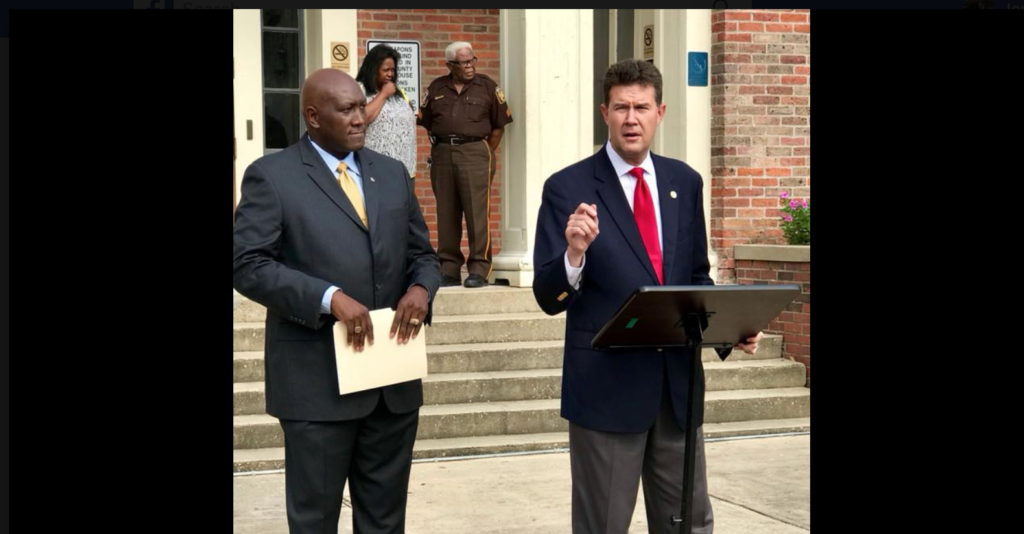
Last week, Alabama Secretary of State John Merrill joined incumbent Bullock County Probate Judge James Tatum in publicly disqualifying his opponent; independent candidate Justin Faulk. Merrill and Tatum met in front of the Bullock County Courthouse on Tuesday to publicly discuss the reasons Faulk was being disqualified. According to the two men Faulk did not send in the required financial form in the alloted timeframe. Since Faulk was running as an independent, a petition signed by members of the community was required to provide him with ballot access. The two men also accuse Faulk, or some of his supporters, of forging signatures on the petition he sent to Tatum’s office in June. Tatum said that after receiving and reviewing the 18 pages and 102 signatures of the petition, it was clear some of the signatures were signed by the same person. Tatum then turned the petition over to Merrill’s office where it was investigated. “As a result of this investigation it was determined that several of those signatures were invalid,” Tatum told the gathering. “Now this is unethical. It’s dishonest, it’s illegal, it is wrong, and it’s corruption at the highest; and this will not be tolerated,” he continued. Faulk told WSFA that he did send in the required paperwork, both to the probate office and the Alabama Ethics Commission. Tatum said the probate office was not the correct place to send the paperwork, and that he never received it. “In regards to the petition, Faulk said as far he knew, every one of the signatures is valid, not forged by him or his five primary supporters who handled the petition,” WSFA reported. “In fact, Bullock County Sheriff Raymond Rogers told WSFA that based on his own investigation, the signatures were not forged and that they were all signed by the very people listed on the 18 pages.” “We’re good, honest people and I will defend myself because I know I am right and he’s wrong,” Faulk said, WSFA reported. Watch Tatum and Merrill’s full press conference below:
Here’s why Alabama’s Open Meetings Law is important to you
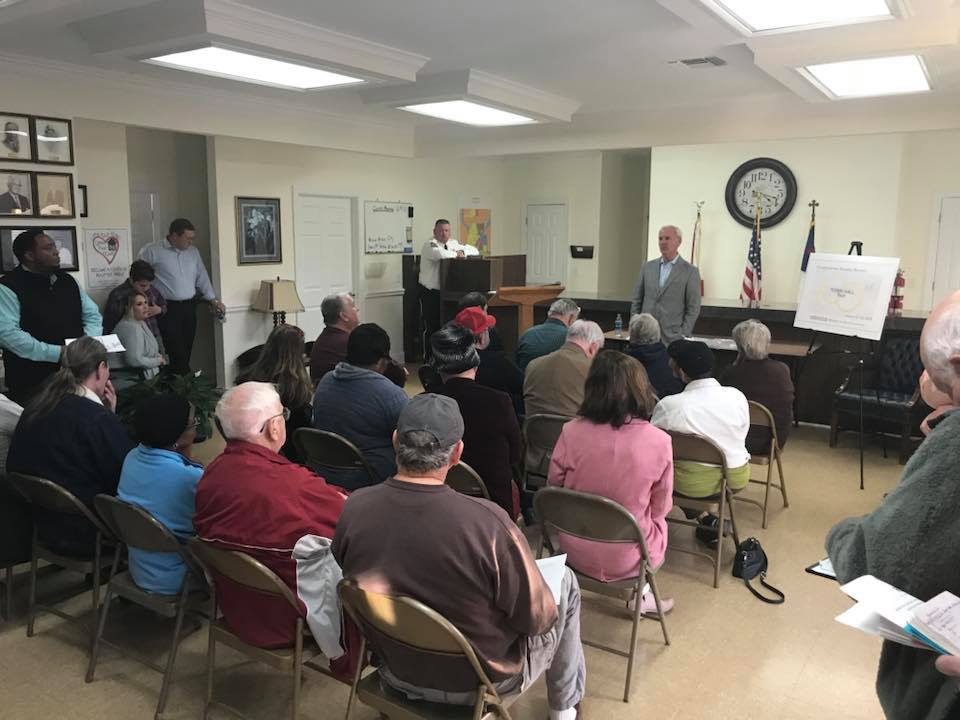
“It was pretty egregious,” said Brandon Cox, publisher and editor at the paper as well as the author of the column that sparked the controversy. Prior to his column, Cox said there were rumblings of access issues in the town of about 200 people because officials had closed a school with little notice by adding a last-minute agenda alteration. After that, he received word about rules barring admission to city meetings and what seemed like a overall refusal to grant public records requests. A call to the city’s clerk and Paint Rock Mayor Brenda Fisk seemed like it wouldn’t lead to much on a Friday nearing deadline as Cox prepared to head out of town for the weekend. Then the phone rang. “She said if you don’t live here, you don’t have any business here,” he said. “She stood by it and she was pretty aggressive about it.” — Almost 300 people crowded into the City Hall auditorium, shouting down supporters of an unpopular insurance change. The mayor was booed from the podium at one point. — At least five, possibly six, council members headed to a back room behind a locked door to iron out a compromise resolution — Under Alabama law, a quorum is half of a body’s members. The City Council has nine members, though one seat is currently vacant. — Experts and advocates said the council’s meeting last week raised eyebrows, especially since they came from behind closed doors and passed a resolution with little discussion. — City officials said there was never five members in the room at one time, but state law also forbids the cycling of members in and out of the room to avoid a quorum. — Advocates said the meeting likely violated the spirit of the law. There isn’t any central database for recording open meeting act violations because they are brought as civil suits, but a cursory search shows several instances of alleged violations over the last few years. Since the 2015 amendments to the Act, there have been at least 10 reported allegations of violations of the law, according to various news reports, with groups ranging from the Alabama Ethics Commission, the Gadsden City Board of Education and the Gulf Shores Schools Board of Education. Last August, a 2016 increase in Alabama teachers’ health insurance premiums was reversed after a judge sided with the Alabama Education Association over open meetings violations, according to the Lagniappe Weekly. Often times, those issue are not prosecuted though, especially when the issues over which an open meeting was closed proves to be non-controversial. — An Alabama citizen, the attorney general, media company or the circuit’s district attorney can bring forward action in civil court. No member of the governmental body can bring suit against the others in that same group. — For each violation of the meeting, each official can be fined $1,000 or half of their governmental monthly salary, whichever is less. The minimum penalty is $1. — Monetary violations can also be levied in cases of improperly called executive sessions. — The court can also invalidate the actions taken in the meeting that violates the act, provided that the complaint is filed within 21 days of the action being made public, similar to the judges reversal in the AEA insurance case. — Multiple violations raised from the same instance are combined into one case. — The governmental body can pay for the expenses of the present or former members that violate the law. With advocates concerned about the violations, some are calling for increased penalties and enforcement of the law. Alabama Sen. Cam Ward, R-Alabaster, who led the charge in his chamber to strengthen the law in 2015, said he wants to revisit the act in the upcoming session. “I think we could look at increasing the penalties,” he said. “You have to make it more of a deterrent or they aren’t going abide by it.” When asked about several cases where bodies may have possibly violated the law accidentally, like a legal official hinted at in Montgomery, Ward was emphatic. “Ignorance of the law is no excuse. On that point, I don’t have a lot of sympathy.” Advocates that talked with the Advertiser previously agreed with that assessment of open meetings laws, saying violations are violations, no matter the intent. “Even if it was inadvertent, it doesn’t take away the fact that there was an attempt to engage in a public decision process without accountability,” said Noel Isama, a senior policy analyst at the Sunlight Foundation, a nonpartisan, nonprofit open government advocacy group. Cox said that in Texas, where he recently worked, there are stringent rules for open meetings and public records training to make sure that officials are well-versed in the laws. “You actually had to take a course and pass a test. Here I don’t think there is any of that. These people want to do well, they just have no guidance,” he said. That ignorance extends itself to public records disclosure, another central piece to the issues in Paint Rock that feel to the wayside amid the explosion of scrutiny related to their closed meetings. Ward said he wants to tighten up those laws as well, which have become increasingly clouded with technological advances. Officials can avoid disclosing their emails, for example, by using a personal account, he said. That intentional skirting of the law is a perfect parallel to the changes he made in 2015 that stopped officials from holding “serial meetings” that skirted the quorum rule on purpose without breaking the law. It comes down to accountability in both meetings and records, Ward said, which helps expose misguided or wrong-doing by public officials. “I think,” Ward said, “they go hand-in-hand because they are about transparency in your governments activities.” Republished with the permission of the Associated Press.
Former Birmingham Mayor William Bell cited for ethics violation

Former Birmingham Mayor William Bell was charged with violating state ethics laws by the Alabama Ethics Commission on Wednesday. Although the details of the violation were not disclosed by the commission, Bell’s attorney Joe Espy said the accusation was in relation to a mandatory meeting Bell held during his re-election campaign last August. Iva Williams, who originally filed the complaint in September accused Bell of violating state law by using city facilities and his office for political activities, and for using his official position for personal gain. Bell held a mandatory meeting in August warning city employees that if his opponent Randall Woodfin won, many of them might lose their jobs. An audio recording of the meeting was released following the ethics complaint. “The political survival of my administration is at stake,” Bell said according to AL.com. “And if you think that is just about William Bell, no it is about everyone in this room. It is about each of us in this room. Because I guarantee you while some may survive, the vast majority of you will not. OK. I’m not trying to put fear I’m just trying to tell you the realities of the situation.” On Wednesday the Alabama Ethics Commission ruled that the complaint be handled administratively referring the case to Jefferson County District Attorney’s Office. “Mayor Bell completely cooperated with the ethics commission and the ethics commission staff,” Espy told AL.com. “It was a very minor technical matter related to that complaint made during the campaign about that meeting. It was resolved administratively. It is concluded,” Although the issue is being resolved, Bell could face a fine.
Alabama Ethics Commission says legislator can work for House Speaker
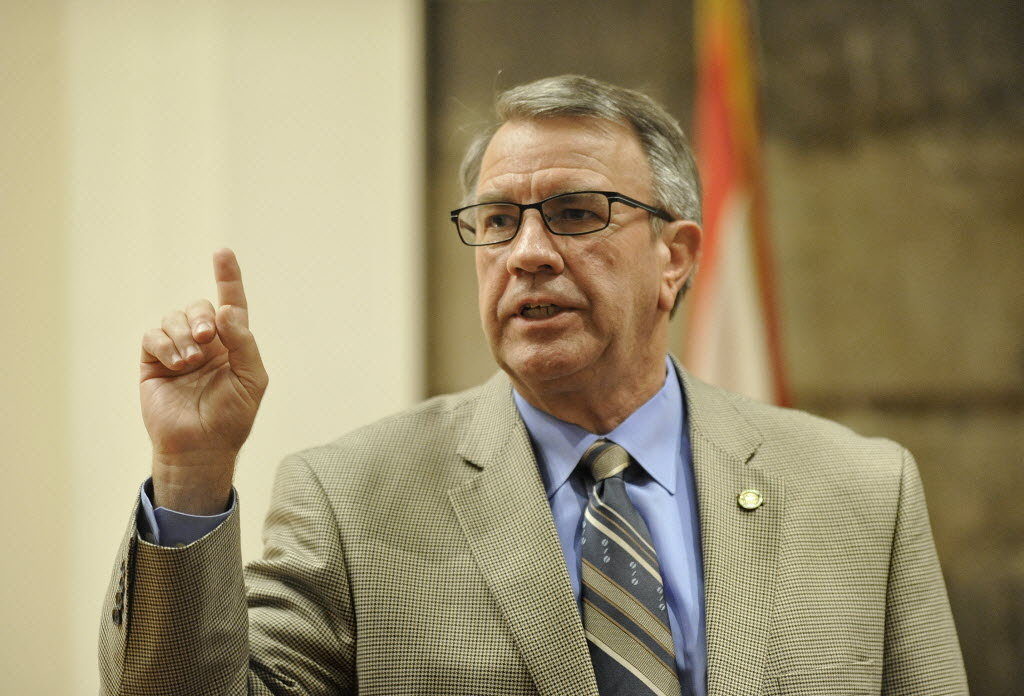
The Alabama Ethics Commission says a retiring member of the House of Representatives can work as House Speaker Mac McCutcheon’s chief of staff without violating the “revolving door” provision of state ethics law. Commissioners issued the advisory opinion Wednesday for Republican Rep. Mark Tuggle of Alexander City. The opinion said Tuggle can do administrative duties but cannot lobby his former colleagues on behalf of outside groups. In a separate matter, the commission will not reconsider an advisory opinion that said a candidate can use campaign funds for child care expenses. Alabama Secretary of State John Merrill’s office asked for the reconsideration, concerned that the wording would open the door to candidates trying to claim all sorts of expenses as campaign related. Commissioners said the opinion was for a specific case. Republished with the permission of the Associated Press.
Kicking Jim Zeigler out of statehouse backfiring? Be careful what you ask for insiders

In a classic case of be careful what you ask for, State Auditor Jim Zeigler, who was told in April of 2018 that we was being unceremoniously kicked out the State House, “because they needed the space” all of a sudden, has found a new space for his office to reside. Ha! It’s in the same building as Ethics Commission. Just when lawmakers thought they were getting Zeigler out of their hair, one the state’s best loud and vocal advocates for taxpayers is now going to be ever so close to the people responsible for maintaining ethics. Allowing him to lodge complaints without so much as leaving the comfort of his building. Let’s be clear, if you think lawmakers wanted Zeigler out so they could use his space rather than to stop him from showing up at press conferences and watching what they were doing I’ve got a bridge to the beach in Az. to sell you. There are so many people in Montgomery who don’t like Jim’s in-your-face style, but as his recent showing in the GOP primary revealed he is doing just fine in the mind’s of the voters. Rather than aim to silence him we need to encourage more lawmakers to be like him. Zeigler is taking his job as a watchdog seriously. On a regular basis he’s questioning the actions and spending of those around him. Let’s not forget, it was Zeigler who pressed the issue of Governor Robert Bentley‘s ethics violations, he spoke out against a bizarre corrections contract for $300 million to a firm already tied up in ethics and bribery charges in Mississippi, he’s been outspoken in advocating for the prioritization of limited infrastructure and transportation money asking ALDOT and John Cooper questions they clearly don’t want to answer. As noted in his follow up yesterday, after THREE months of waiting as Cooper and his team dodge Alabama’s open records laws. It’s clear the efforts to move him were nothing but a stunt but those wanting to silence him are going to have to try harder.
Here’s how much statewide runoff candidates have raised, spent since the primary

The July 17 runoff elections less than a week away. Campaign finance reports have been filed weekly with the Secretary of State’s office since the June 5 primary. Looking a them now serves as a good marker of how much support candidates are receiving, and how much money they’re spending on their campaigns in hopes of cinching their party’s nomination. Recap of the month Statewide runoff races have taken a negative turn with Lt. Governor candidates Will Ainsworth and Twinkle Andress Cavanaugh firing shots back and forth at one another via television ads. Restarting their campaigns following the tragic death of Steve Marshall‘s wife Bridgette Genery Marshall, Marshall’s opponent Troy King vowed to keep on message of his political record and qualifications going forward. However, on Monday he filed a complaint against Marshall with the Alabama Ethics Commission, accusing Marshall and his staff of accepting PAC-to-PAC money despite the state’s ban. Even the race for Alabama Commissioner of Agriculture and Industries took a dark turn earlier this week after Gerald Dial released a campaign ad dredging up a 32 year old divorce document between his opponent Rick Pate and his ex-wife, Carolyn Pate. A look at the numbers Note: All numbers come from weekly campaign finance reports filed from period June 1 to July 6 Lieutenant Governor’s Race: Will Ainsworth Raised: $93,425 Spent: $568,543.94 Twinkle Andress Cavanaugh Raised: $513,300.57 Spent: $658,060.05 Attorney General’s Race: Troy King Raised: $421,610 Spent: $422,598.28 Steve Marshall Raised: $515,344.60 Spent: $263,341.06 Commission of Agriculture and Industries race: Gerald Dial Raised: $58,240 Spent: $209,533.40 Rick Pate: Raised: $97,100 [35,000 in receipts from sources other than cash] Spent: $152,766.52 Supreme Court place 1 race: Brad Mendheim: Raised: $178,050 Spent: $183,521.10 Sarah Stewart Raised: $11,000 Spent: $263,179.52 Civil Appeals Court, place 1 race: Christy Edwards Raised: $120,500 [Receipts from other sources $1,200] Spent: $129,110.69 Michelle Thomason Raised: $23,525 [$51,124.96 in receipts from other sources] Spent: $86,965.83 Criminal Appeals Court, place 2 Rich Anderson Raised: $7,600 Spent: $19,105.23 Chris McCool Raised: $87,000 [$1,448.86 in receipts from other sources] Spent: $107,820.36
Troy King files ethics complaint against opponent, AG Steve Marshall

The primary runoff race for Alabama Attorney General is once again heating up now that both candidates, Troy King and Steve Marshall, have resumed their campaigns following the tragic death of Marshall’s wife. On Monday, King filed a complaint against Marshall with the Alabama Ethics Commission, accusing Marshall and his staff of accepting PAC-to-PAC money despite the state’s ban. The complaint details how King believes Marshall transferred at least $435,000 from the Republican Attorneys General Association (RAGA) PAC to his campaign fund, which has since been spent on television commercials, robocalls, direct mail to voters and other campaign activities. “As Attorney General, Steve Marshall should be upholding the law, not breaking it. Campaign finance laws should apply to him, just like they apply to everyone else,” King said. “As a former Attorney General, I understand that only when our laws are enforced as written do they act as an honest deterrent to election campaign wrongdoing. I am asking the Alabama Ethics Commission to investigate and prosecute this case swiftly and to the fullest extent of the law.” The state’s PAC-to-PAC ban In 2010, the State Legislature passed the PAC-to-PAC ban in 2010 in order to restrict donor’s ability to hide contributions by shuffling them through multiple PAC’s. AL.com recently reported that Marshall’s campaign found a loophole in the law and is doing nothing wrong. In fact, Marshall’s campaign told Alabama Today they’re pleased to accept the RAGA support. “We are pleased to have received support from RAGA Action Fund and trust they have complied with Alabama law,” Julia Mazzone said on behalf of the Marshall campaign. But King points to similar instance involving a RAGA PAC donation that occurred in 2014. Then former Attorney General Luther Strange tried accept a donation from the PAC, but ultimately returned the funds due to the PAC-to-PAC ban after an ethics complaint was filed against him. “Marshall should return the illegal money he received into his campaign immediately,” King continued. “Steve’s Marshall’s flagrant disregard for the law shows that he is not part of cleaning Montgomery up. Instead, he is among its biggest polluters. The corruption will not end until those who are corrupting the system are removed from office. Alabamians who are sick and tired of business as usual will have their say soon enough when they cast their votes on July 17th.” Knowingly violating the PAC-to-PAC ban is considered a Class A misdemeanor and is punishable by up to a year in jail and a $6,000 fine. This article has been updated to include a statement from the Marshall campaign.


